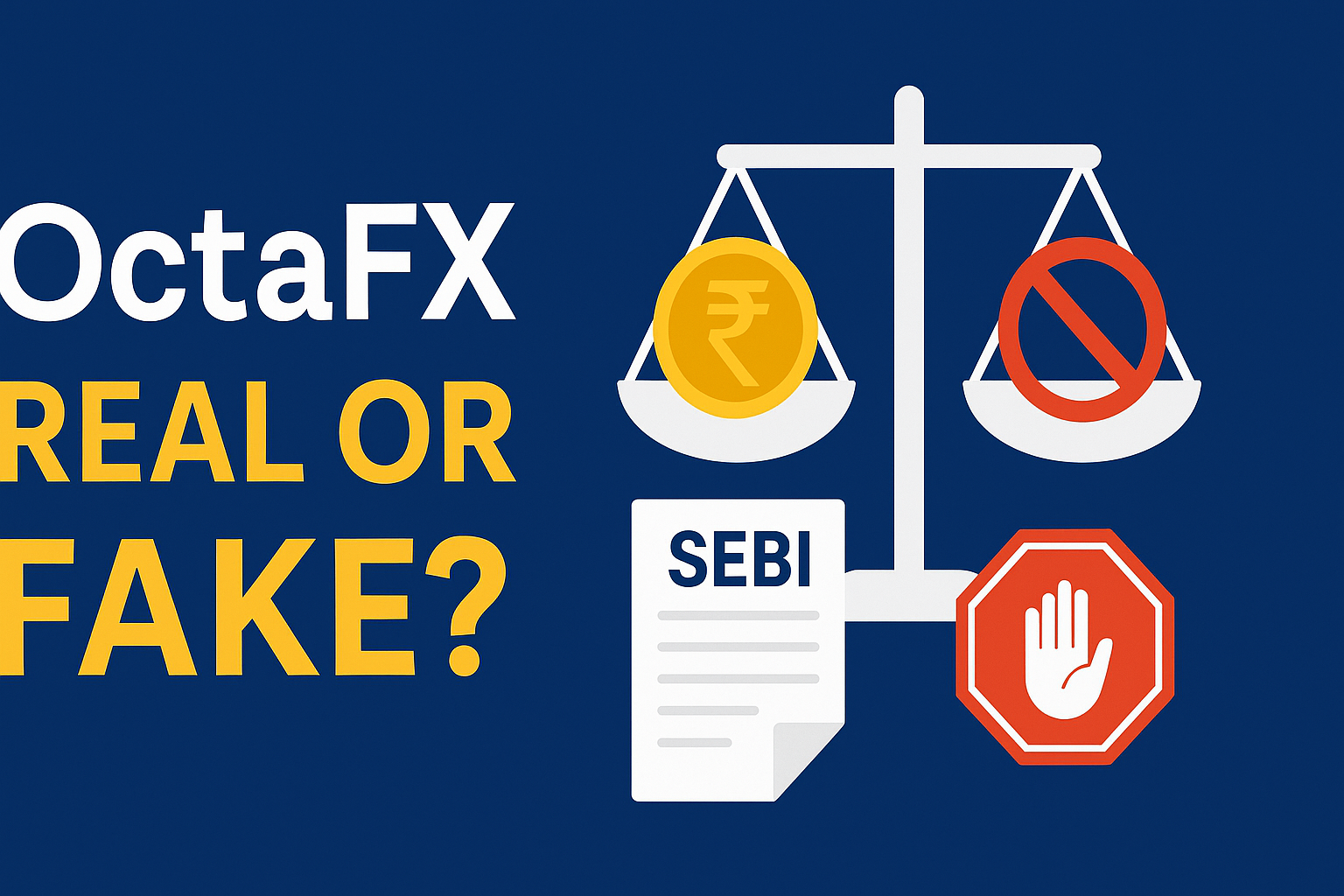If you’ve been dabbling in forex trading or have come across flashy ads by platforms like OctaFX promising “easy profits” through currency trading, then take a pause. Is OctaFX real or fake?
Because here’s the reality: what looks easy and exciting on the surface can often be illegal and unregulated underneath.
Let’s talk about OctaFX India Pvt. Ltd. (now renamed Tauga Private Limited) and how they got into serious trouble with SEBI for running an unauthorized forex trading platform.
SEBI recently passed a settlement order against them, and this case offers a lot of lessons, not just for brokers but for every retail investor and trader out there.
What Was OctaFX India Doing Wrong?
First things first, OctaFX.com, the platform used by most traders, is not SEBI registered.
It’s an offshore forex trading platform, and promoting or allowing Indian retail users to trade through it is illegal under Indian law.
Forex trading itself isn’t illegal, but there are strict rules about how and where it can be done. SEBI only allows currency trading through recognized exchanges like NSE, BSE, and MSE, and only in approved currency pairs.
But OctaFX (the .com version) is offshore, and not under SEBI’s jurisdiction. Promoting it in India is a major violation, and that’s exactly what SEBI caught them doing.
Worse?
When SEBI started investigating, OctaFX India denied any connection with the unregulated platform.
And guess what? That just made things worse.
The Trigger: A Tip-Off and a Full-Blown Investigation
Back in March 2022, SEBI received an alert from BSE. The exchange had examined the activities of OctaFX and suspected that they were offering an illegal forex trading platform to Indian investors.
That’s when SEBI stepped in.
They conducted a detailed investigation and found some pretty damning facts:
- OctaFX India was associated with the offshore platform (OctaFX.com).
- They had suppressed this association from SEBI and BSE.
- They did not inform SEBI about the Enforcement Directorate (ED) conducting searches at multiple OctaFX premises.
All of this violated SEBI’s regulations, especially the Code of Conduct for Stock Brokers and Intermediaries Regulations.
Let’s be honest, if you’re a SEBI-registered broker and you’re hiding ED raids or denying connections to shady platforms, you’re asking for trouble.
SEBI’s Response: Cancel Registration, Issue Show Cause Notice
Once SEBI had enough evidence, it acted.
They appointed a Designated Authority to conduct an official enquiry. Based on the findings, the authority recommended the cancellation of OctaFX India’s broker registration.
A formal Show Cause Notice (SCN) was issued on May 9, 2024. The company was given 21 days to respond.
At this point, OctaFX India had two options:
- Fight the case legally and face possible cancellation and penalties.
- Settle the matter under SEBI’s Settlement Proceedings Regulations, 2018.
They chose option two.
The Settlement: What OctaFX Agreed To
Now comes the interesting part, the settlement terms.
OctaFX India (now Tauga Private Limited) filed a Settlement Application with SEBI in August 2024. After several rounds of discussions, they proposed revised terms, and here’s what they agreed to:
Monetary Penalty:
- ₹32,00,000, that’s Thirty-Two Lakh Rupees as the settlement amount.
Not a small amount, but perhaps less than what they would have had to pay had SEBI gone for full-fledged penal action.
Non-Monetary Penalties:
- Surrender SEBI Registration — Their official broker license (Registration No. INZ000294138) is now gone.
- 5-Year Ban — They cannot apply for any SEBI registration for the next five years.
- 1-Year Market Ban — They are barred from trading or investing (directly or indirectly) in Indian securities for one full year.
To put it simply: they’re out of the Indian market — both as a broker and as a trader — for a long time.
What Does This Mean for Retails Traders?
This case is a textbook example of how foreign platforms misuse the Indian market and how SEBI is finally tightening the noose.
For retail traders, here’s what you need to remember:
1. Just Because It’s Online Doesn’t Mean It’s Legal
If a platform is offering forex pairs like EUR/USD or GBP/JPY, be cautious. These pairs are not permitted for retail trading in India unless through approved exchanges.
Platforms like OctaFX.com may appear legit, but they are not regulated by SEBI.
2. Always Check SEBI Registration
A broker or platform might claim to be regulated; always double-check their SEBI registration number.
3. Don’t Fall for the Glamour of Global Forex
Yes, forex markets are huge.
Yes, there’s money to be made. But Indian law is very strict about how you can participate.
Stick to NSE/BSE currency segments and trade only in approved pairs like USD/INR.
4. Get Help if You’ve Been Misled
We’ve spoken to dozens of traders who were lured by demo accounts, high-leverage trading, and fake “international” advisors.
If you’ve lost money on such platforms or been manipulated, file a complaint in SEBI.
And if you’re not sure how to go about it, that’s where we come in.
Need Help?
We’ve helped several traders recover funds, file SCORES complaints, and understand their rights as investors.
Cases like OctaFX show just how important it is to be aware of SEBI regulations and to think twice before trusting flashy apps and promises of high returns.
If you’ve traded on OctaFX.com or forex trading platforms and now feel stuck or cheated, don’t stay silent.
Register with us — we’ll help you understand your legal options, draft your complaint, and guide you through the process.
Conclusion
The ₹32 lakh settlement by OctaFX India is a wake-up call to all brokers and platforms operating in grey zones.
But more importantly, it’s a reminder to retail traders that compliance matters, and ignorance isn’t an excuse.
So the next time you see a foreign trading platform promising big returns, ask yourself:
“Is this platform SEBI-approved?”
“Am I trading legally?”
“What are the risks?”
Because in the end, protecting your capital starts with asking the right questions.







